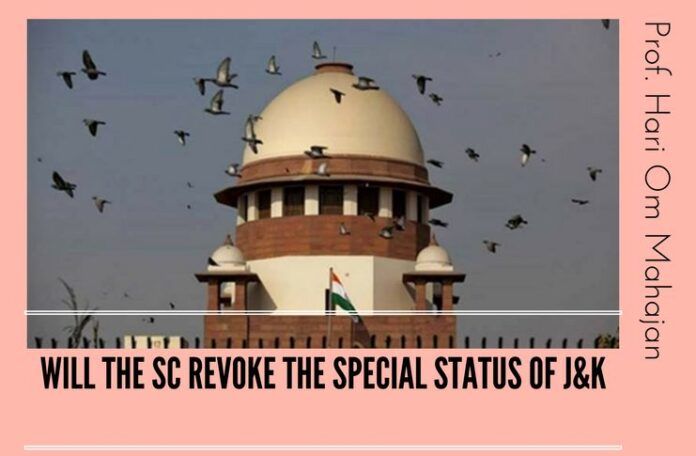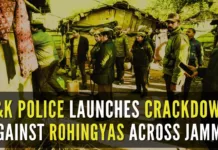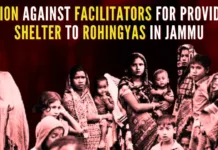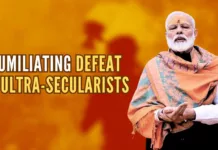
PIL in the Supreme Court of India on the atrocious Article 35-A has rattled Kashmiri Muslims, separatists, semi-separatists and their supporters included. They are denouncing the Government of India for what they call the “military approach to the problem of Kashmir” and also accusing it of unleashing what they term as “a judicial/Constitutional aggression against the people of Kashmir in attempts to undo Article 35-A of the Indian Constitution, which ensured special rights for the permanent residents of Jammu and Kashmir”.
Article 35-A was Jawaharlal Nehru’s conspiracy against the nation. It, on the one hand, raised a wall of hatred between Jammu & Kashmir and rest of India by declaring all the Non-Permanent Residents of the state, including even the President and Prime Minister of India, as persona non-grata. On the other hand, it deprived daughters of Jammu & Kashmir of their fundamental right to marry anywhere in the world and empowered the Muslim Government in the state to deny citizenship rights to Hindu-Sikh refugees from Pakistan. Children of daughters of Jammu & Kashmir married outside Jammu & Kashmir with Non-Permanent Residents of the state cannot exercise any citizenship right, including the right to inherit their mothers’ property. In effect, Article 35-A gave absolute and unbridled legislative power to the Government of Jammu & Kashmir to grant or not to grant citizenship rights to a person or a group of persons who settled in Jammu & Kashmir after May 1944.
That Article 35-A was a fraud committed by Jawaharlal Nehru on the nation could be seen from the fact that it was not discussed in and adopted by the Parliament, the supreme law-making body in the country. It was applied to Jammu & Kashmir on May 14, 1954 through a Presidential Order violating not only Article 368 but also subverting the very basic structure of the Indian Constitution and Article 14 (equality and no discrimination) and Article 19 (right to settle anywhere in India) of the Indian Constitution. Article 35-A finds mention only in the second appendix of the Constitution. In other words, it is not part of the main body of the Constitution.
Article 35-A also violates the preamble of the Indian Constitution, 1950, and Jammu & Kashmir Constitution, 1957. The preambles of both the Constitutions talks about “equality of status and of opportunity”.
Why are the Kashmiri Muslims, without any exception, vehemently opposing the otherwise national and rational demand seeking revocation of Article 35-A? Kashmiri Muslims see in the judicial raking of Article 35-A as attempts to “change rules for special rights of people of Jammu & Kashmir (read Muslims) as an existential threat of changing the Valley’s demographic profile”. They say that “revoking Article 35-A can potentially lead to a demographic change in the state as outsiders are facilitated to buy land and property in the state” and “this is completely unacceptable to them”.
The growing anger has also stemmed from the fact that the Narendra Modi Government, according to them, was a “passive collaborator” in the petitions filed before the Supreme Court. They say that their belief was “strengthened not because of the statements from the ruling party at the Centre and its frontal organisations but the Central government’s attitude itself”. They openly — and in a threatening tone — say that the “judicial attack on Jammu & Kashmir’s special status is being ‘stage managed’ by the Central Government”.
“Article 35-A had been challenged in the Supreme Court earlier also but each time, the Central government filed a counter-affidavit. Now, not only had the Central government not filed a counter-affidavit, the Attorney General in fact argued for a wider debate on the Constitutional provision,” they are saying. They are asking “why the Jammu & Kashmir Government has been left alone to defend Article 35-A and whether it was not the responsibility of the Central Government to defend the Constitution?”
They also are saying that the “government had erred in the Supreme Court and that instead of keeping quiet, it could have easily told the apex court that this was a political issue which needed to be discussed in Parliament”. “Alternatively, if the government felt that there were some issues with Article 35-A relating to the fundamental rights of Jammu & Kashmir women getting married to men outside the state, then the government should have argued that the matter be referred to a 9-judge Constitutional bench.”
The general view in Kashmir is that “if Article 35-A is removed through a judicial decision, there would be widespread trouble in the state”. Some even threaten that “if Article 35-A and Article 370 are tampered with, India will see an uprising like no other witnessed up to now”. In addition, they are asserting that the “alliance between the Peoples’ Democratic Party (PDP) and the Bharatiya Janata Party (BJP) will, in all likelihood, breakdown if Article 35-A is struck down by the Supreme Court”.
They have created a Muslim Republic of Jammu & Kashmir on the territories of the sovereign Indian state.
The view of the Kashmiri Muslims that the abrogation of Article 35-A would alter the state’s demography is as ridiculous as it is communally-motivated. They have no right to talk about demography. They have already rid Kashmir of all Hindus and converted it into a 100 per cent Muslim region. It has become a no entry zone for the Indians. As for Jammu, which is a home to 2 million refugees (all victims of radical Islamists) from Pakistan, Pakistan-occupied-Jammu & Kashmir and Kashmir, Kashmiri Muslims have been leaving no stone unturned to change its Hindu-majority character so that Jammu also turned Kashmir and they could tell the international community that the whole of the state wanted separation from India. They have settled in Jammu, several 1000s of Rohingya and Bangladeshi Muslims, who have become a grave threat to the national security. Kashmiri Muslim leadership is so communal, insensitive and inhuman that it dubs the Hindu-Sikh refugees from Pakistan as foreigners and rejects as communal the demand in Jammu for the eviction of Rohingya-Bangladeshi Muslims.
The Kashmiri leaders are mortally afraid of wider discussion on Article 35-A and they want the Government of India to treat Article 35-A as a political issue. There are cogent reasons for that. They know their case cannot stand any judicial scrutiny. After all, there are constitutional issues involved in it. The Government of India knew it and that was the reason that it, unlike the Jammu & Kashmir Government, didn’t file any affidavit in the Supreme Court. The Government of India knew that the national mood was, and is, against the discriminatory, invidious and unjustifiable Article 35-A. And the BJP, which has been at the helm at the Centre, on more occasions than one dismissed Article 35-A unconstitutional and anti-women.
As said, Article 35-A creates a high wall between the people of Jammu & Kashmir and rest of the Indian people. How is it that Kashmiri Muslims can exercise all rights all over India and other Indians can’t exercise any right in Jammu & Kashmir? It is not done and the Kashmiri Muslim leadership knows it very well. Hence, the desperate Kashmiri Muslim leaders want the Government of India to defend Article 35-A or treat the whole issue as political.
They hold out a threat that there would be an upheaval in Kashmir if Article 35-A and Article 370 were tinkered with. It is their old technique. The fundamental question to be asked is: When was there no upheaval in the Valley after the accession of Jammu & Kashmir in October 1947? The history of Kashmir post-1947 has been one of communal protests, upheavals and emotional blackmail, despite the fact that the Kashmiri Muslims have been ruling the state and exploiting Jammu and Ladakh to the hilt since October 1947.
In sum, it can be said that the Kashmiri Muslims’ case is weak and it is time to throw out Article 35-A and Article 370 lock, stock and barrel, as they have created a Muslim Republic of Jammu & Kashmir on the territories of the sovereign Indian state. It is hoped that Prime Minister Narendra Modi would undo Nehru’s wrongs and bring Jammu & Kashmir closer to New Delhi than ever before.
- ‘Kashmir My core constituency’: Revisiting July 12, 2003 to understand politics, Omar Abdullah-style - March 15, 2024
- Total deviation from traditional approach: Seven takeaways from PM Modi’s March 7 Srinagar visit - March 9, 2024
- Status of political parties: Why is further J&K reorganization imperative? - March 1, 2024











One aspect of J&K which has not been brought out sufficiently would be that the state is living off central aid. With very little revenue from economic activities the state budget is being funded out of central government funds. I understand that for the last many years no person pays electricity bills in Kashmir. Is this so?
Why should my tax money go to a state which steadfastly refuses to be part of the national main stream. Can we do a study on this and bring out these points to counter the seccesionists.
excellent article. Its a two pronged approach being followed by communal Kashmiri Muslims. On one hand, they want 35A/370 to stop the entry for non-Islamist from rest of India into J&K but on the other bring in Islamists from Myanmar and Bangladesh to occupy Hindu/Sikh dominated Jammu. If people from rest of India can’t go and settle in J&K, Can’t buy property there due to 35A, the same must apply to Rohingyas who are being attempted to be settled there. In fact, GOI must use this situation to their advantage in SC to argue against 35A/370
Read some history dear and find out the truth for yourself.
Please let me know atleast 1 good thing he did to the country .The more I hear these days about him, sooner to remove 14 Nov as Children’s day, stop continued brainwashing of kids in school about “Chacha Nehru”